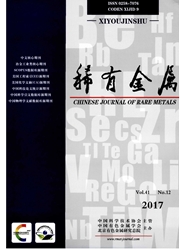

 中文摘要:
中文摘要:
Zn的标准电极电位介于Mg和Fe之间,同时Zn也是人体必需的微量元素。所以Zn及Zn合金作为新型的生物可降解金属材料最近几年受到了广泛关注。针对Zn及Zn合金应用于心血管支架及骨组织修复材料,近年来在体外和体内生物相容性、降解速率进行了较多的研究。本文总结了近几年新型可降解生物Zn合金的研究结果,在降解速率、生物相容性和力学性能等三方面概述了研究进展,明晰目前存在的问题与不足,并展望了生物可降解Zn合金的未来发展方向。
 英文摘要:
英文摘要:
Zinc (Zn) is an essential trace element in human body, whose standard electrode potential is between that of Mg and Fe. Therefore, Zn and Zn-based alloys have been developed as a new class of metallic biodegradable materials in the last few years. Based on the recent results on their biodegradable rates and biocompatibility in vitro or in vivo, Zn and Zn-based alloys have been considered as potential cardiovascular stents or bone tissue repair materials. This review paper summarized the research results and development of biodegradable Zn-based alloys in recent years, mainly including degradation behaviors, biocompatibility and mechanical properties. Meanwhile, in view of the existing problems and shortcomings, the future research directions on this topic were proposed.
 同期刊论文项目
同期刊论文项目
 同项目期刊论文
同项目期刊论文
 期刊信息
期刊信息
